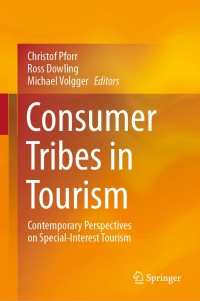Buy Consumer Tribes in Tourism: Contemporary Perspectives on Special-Interest Tourism 1st Edition PDF ebook by author Christof Pforr; Michael Volgger; Ross Dowling – published by Springer in 2021 and save up to 80% compared to the print version of this textbook. With PDF version of this textbook, not only save you money, you can also highlight, add text, underline add post-it notes, bookmarks to pages, instantly search for the major terms or chapter titles, etc.
You can search our site for other versions of the Consumer Tribes in Tourism: Contemporary Perspectives on Special-Interest Tourism 1st Edition PDF ebook. You can also search for others PDF ebooks from publisher Springer, as well as from your favorite authors. We have thousands of online textbooks and course materials (mostly in PDF) that you can download immediately after purchase.
Note: e-textBooks do not come with access codes, CDs/DVDs, workbooks, and other supplemental items.
eBook Details:
Full title: Consumer Tribes in Tourism: Contemporary Perspectives on Special-Interest Tourism 1st Edition
Edition: 1st
Copyright year: 2021
Publisher: Springer
Author: Christof Pforr; Michael Volgger; Ross Dowling
ISBN: 9789811571503, 9781000339826
Format: PDF
Description of Consumer Tribes in Tourism: Contemporary Perspectives on Special-Interest Tourism 1st Edition:
This book adopts a collectivist perspective on special interest tourism consumption, bringing together research on ‘special interest tourism’ and ‘niche tourism’ as well as more recent research into the interdisciplinary applications of the sociological concept of neo?tribes. It promotes a shift in perspective away from special interest tourism understood as a sum of similarly motivated individuals, to a collective view of special interest tourists who share common characteristics (e.g., shared values, beliefs and mutual interests) and group structures. This approach provides a better understanding of groupings that are not unified by a common tourism motivation, but brought together by otherwise conditioned commonalities in actual behavior triggered by supply-side contexts (e.g., Airbnb). The book considers tourism micro?segments as consumer tribes (i.e., as symbolic communities) in which individuals are embedded and loosely bound together. As there is limited research on the collectivist perspective on special interest tourism consumption, in the first part the book’s conceptual/theoretical discourse contributes to a better understanding of ‘groupings’ in tourism behavior but also collectives that are not unified by a common tourism motivation. Presenting international examples, the book explores in Part 2 the group culture of a range of tourist tribes by describing emerging tourism micro-segments, identifying shared identities, and analyzing their collective mechanisms.





